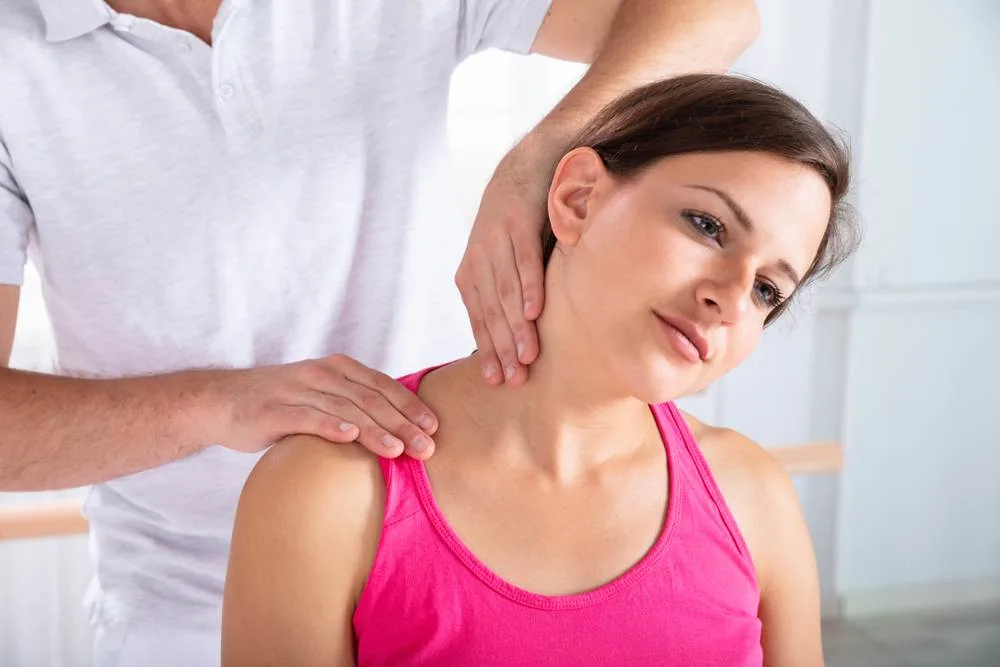Car accidents are abrupt, jarring events that can leave you with more than just a damaged vehicle. One of the most common physical consequences of these incidents is neck pain. Often stemming from the sudden forces exerted during a collision, neck pain can significantly affect your daily life. Understanding why this pain occurs and how it manifests can help you seek the right treatment to recover.
What Causes Neck Pain After a Car Accident?
In many auto accidents, especially rear-end collisions, the head is suddenly jerked backward and then forward. This violent motion can strain or tear neck muscles and ligaments, a condition commonly referred to as “whiplash.” However, neck pain can arise from more than just whiplash. The sudden stop of a vehicle—even without direct impact—can cause the head to shake violently enough to create similar effects.
Symptoms of Neck Pain After a Car Accident
If you’ve been involved in a car accident and start to notice discomfort in your neck area, you might be experiencing symptoms such as:
- Stiffness and Reduced Range of Motion: Difficulty in moving the neck normally without pain.
- Pain that Worsens with Movement: Any neck activity exacerbates the discomfort.
- Headaches: Often starting at the base of the skull.
- Dizziness: A feeling of spinning or losing one’s balance.
- Tenderness to Touch: The neck feels sore when touched.
- Fatigue: General tiredness which can be exacerbated by the neck pain.
- Difficulty Sleeping: Pain may interfere with getting a good night’s rest.
- Radiating Pain: Pain that moves from the neck to the shoulders or arms.
When to See a Doctor for Neck Pain After a Car Accident

Always seek professional medical advice following a car accident to accurately assess the severity of your neck injury and to develop a suitable treatment plan. Consulting with healthcare professionals ensures you receive tailored guidance based on the specific details of your condition, facilitating a safe and effective recovery.
You should seek immediate medical attention if you experience any of the following symptoms mentioned above, especially if you are experiencing:
- Severe Pain: If the neck pain is intense and unbearable, it could suggest significant injury.
- Pain that Spreads: If the pain extends to the arms or legs, it may indicate nerve damage or spinal injury.
- Numbness or Tingling: These sensations, especially in the arms or hands, could be signs of nerve involvement.
- Weakness: Difficulty with muscle coordination or feeling weak in the arms or legs.
- Loss of Movement: Any reduction in your ability to move your head or limbs.
- Persistent headaches: Persistent or severe headaches that develop after an accident.
Promptly addressing neck pain after a car accident by seeking medical evaluation and following an appropriate treatment plan can significantly improve recovery outcomes. Remember, early intervention by healthcare professionals is key to preventing long-term damage and ensuring a thorough recovery.
Potential Causes of Neck Pain After a Car Accident
The neck is particularly vulnerable to injury during auto accidents due to the sudden and forceful movements that can occur. Here are some of the potential causes of neck pain following such events:
- Whiplash: The most common cause, where the head is suddenly jerked back and forth, exceeding its typical range of motion.
- Muscle Strains: Overextension or tearing of neck muscles.
- Ligament Sprains: Similar to strains but involving ligaments, which are stretched or torn.
- Herniated Discs: Disks between the vertebrae can rupture or bulge, pressing on spinal nerves.
- Spinal Stenosis: Narrowing of the spinal canal can occur after an injury, putting pressure on the spinal cord and nerves.
Identifying the underlying cause of neck pain is essential for choosing the right treatment plan and avoiding further complications.
Treatment Options for Neck Pain After a Car Accident

When dealing with neck pain after a car accident, a range of treatment options are available, from home care to professional interventions and, in some cases, surgical solutions. Here’s a comprehensive look at these options:
Home Care
Home care is often the first line of treatment for mild to moderate neck pain and can include:
- Rest: Initially, rest can be beneficial to reduce inflammation and avoid aggravating the injury. However, prolonged inactivity can hinder recovery.
- Ice and Heat Therapy: Ice packs can help reduce swelling and inflammation immediately after the injury. After a couple of days, switching to heat (like a warm cloth or heating pad) can help relax and loosen tissues and stimulate blood flow.
- Over-the-Counter Pain Relievers: Nonsteroidal anti-inflammatory drugs (NSAIDs), like ibuprofen, can help reduce pain and swelling. Always follow the dosage recommendations and consider any other health factors.
Professional Care
Professional treatment options are recommended when pain persists or is severe:
- Physical Therapy: Physical therapists can develop a personalized exercise program to help strengthen the muscles around the neck and improve posture, which can alleviate pain.
- Chiropractic Care: Chiropractors can provide spinal manipulation to help improve spinal function and alleviate stress on your system.
- Acupuncture: This involves the insertion of needles into specific points on the body, which can help relieve pain and tension.
- Massage Therapy: Therapeutic massage can help reduce muscle tension and provide relief from pain.
Medication and Injections
In cases of intense pain, a medical professional might recommend:
- Prescription Pain Relievers: Stronger painkillers may be prescribed if over-the-counter medications are ineffective.
- Muscle Relaxants: These can help treat muscle spasms associated with neck pain.
- Corticosteroid Injections: Injected directly into the nerve roots or into the muscles, these can help reduce swelling and allow inflamed nerves to recover.
Surgical Options
Surgery is generally considered a last resort and is usually recommended only for serious conditions that do not respond to other treatments:
- Discectomy: Removal of a damaged spinal disc if it is pressing on a nerve root or the spinal cord.
- Spinal Fusion: Surgery to join two or more vertebrae, stabilizing the spine.
- Laminectomy: Removal of part of the vertebra that is putting pressure on the spinal nerve.
Preventative Measures and Long-Term Care
Preventing future neck pain and maintaining neck health after a car accident requires attention to both physical care and lifestyle adjustments. Here are some effective strategies to help safeguard your neck:
- Ergonomic Adjustments: Set up your work and home environments to support good posture. Ensure that computer screens are at eye level and that chairs offer proper back support.
- Regular Exercise: Incorporating general physical activity and specific exercises to strengthen the neck and upper back muscles can greatly enhance neck stability and reduce the risk of future injuries.
- Lifestyle Changes: Maintaining a healthy weight, managing stress effectively, and ensuring a nutrient-rich diet can all contribute to overall health and reduce strain on the neck.
- Proper Posture: Being mindful of maintaining good posture throughout the day can significantly relieve pressure on the neck and spine.
- Routine Chiropractic Check-ups: Regular visits to a chiropractor can help maintain spinal health and catch potential issues before they become problematic.
Implementing these preventative measures can help not only in recovering from current neck pain but also in avoiding future discomfort.
Beyond Therapy: Lifestyle Habits for Pain-Free Living After an Auto Accident
Adopting certain lifestyle modifications can significantly enhance the benefits of non-invasive therapies and support your journey to a pain-free life post-accident. These adjustments can help mitigate pain, improve mobility, and prevent further injury:
- Stay Active: Regular, gentle exercise, as recommended by your healthcare provider, can help maintain mobility and reduce stiffness.
- Practice Good Posture: Proper posture reduces strain on your body, especially on injured areas, and promotes more efficient healing.
- Healthy Eating: A balanced diet rich in anti-inflammatory foods can support tissue repair and overall health.
- Stress Management: Techniques such as meditation, deep breathing, or yoga can reduce stress, which is known to exacerbate pain.
- Adequate Sleep: Quality sleep is crucial for the body’s healing process, enhancing recovery from injuries sustained in auto accidents.
Learn more about 7 Tips for Faster Car Accident Recovery
Start Your Recovery Journey with Affordable Chiropractic Killeen
Recovering from a car accident can be a complex process, requiring not just immediate care but also long-term strategies to ensure complete healing and prevent future issues. At Affordable Chiropractic Killeen, we understand the intricacies of car accident injuries and offer a comprehensive range of services tailored to meet your needs. From chiropractic therapy and spinal decompression to active rehab and on-site X-rays, we provide holistic care to help you get back on your feet.
Contact Affordable Chiropractic today and take the first step toward a pain-free life after your car accident.

